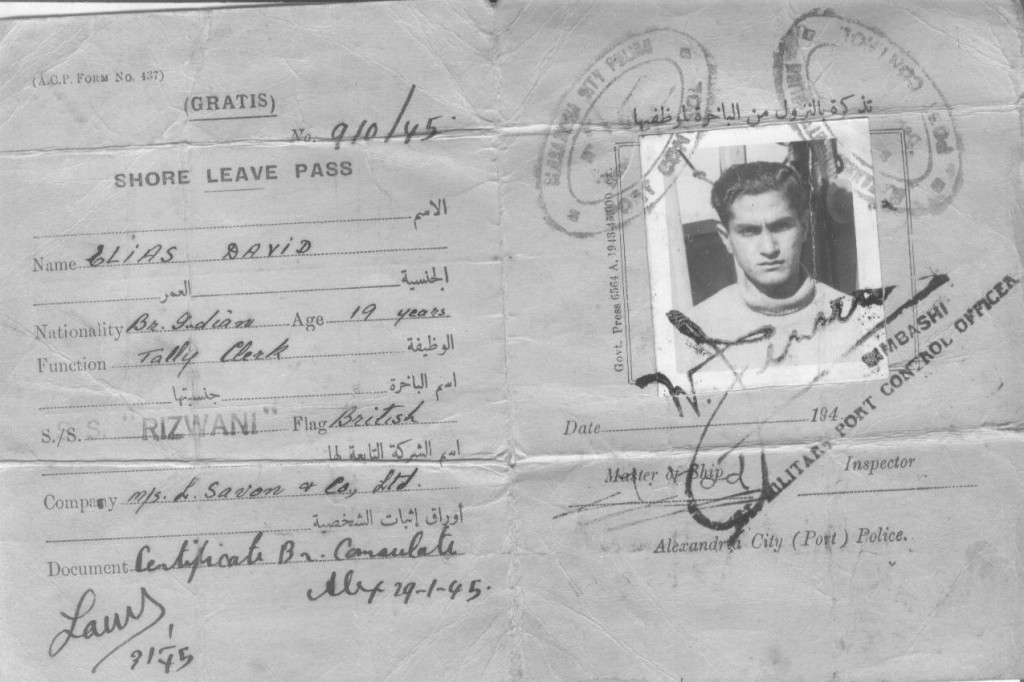Haim Watzman

He’d been on the boat for three weeks, sailing from India’s west coast across the Arabian Sea, into the Gulf of Aden, through the Red Sea and the Suez Canal to the cosmopolitan Mediterranean port. Apparently there were no stops along the way — on his pay slip, nothing is listed under “cash advances during the voyage.” Or perhaps there were and he chose not to disembark. The Rizwani, merchant carrier of the Mogul Line, Bombay, was built in Glasgow in 1930 expressly to ferry Muslim pilgrims to Mecca. While the pilgrimage season had been the previous month, the ship might have stopped at an Arabian port, and Tally Clerk Levy might have thought it best to stay on board.
 After being cooped up on what was, by merchant marine standards, a small boat, he was probably eager to get off and explore. The port he’d landed in had a reputation for offering exotic adventures and pleasures that would not get reported home. Bing Crosby was on the radio that day, singing “Ac-Cent-Tchu-Ate the Positive” with the Andrews Sisters. The good-times, Father Divine-inspired prosperity gospel sermon had hit Billboard’s charts: “You’ve got to ac-cent-tchu-ate the positive/E-li-minate the negative/Latch on to the affirmative/Don’t mess with Mister In-Between.”
After being cooped up on what was, by merchant marine standards, a small boat, he was probably eager to get off and explore. The port he’d landed in had a reputation for offering exotic adventures and pleasures that would not get reported home. Bing Crosby was on the radio that day, singing “Ac-Cent-Tchu-Ate the Positive” with the Andrews Sisters. The good-times, Father Divine-inspired prosperity gospel sermon had hit Billboard’s charts: “You’ve got to ac-cent-tchu-ate the positive/E-li-minate the negative/Latch on to the affirmative/Don’t mess with Mister In-Between.”
My Very Own Genre
Haim Watzman Once again I’ve been called on to review a book about an American who served in the Israeli army. This time it’s stand-up comedian Joel Chasnoff’s The 188th Crybaby Brigade, in The Jerusalem Report. (Four years ago I reviewed Jeffrey Goldberg’s Prisoners in The Washington Post.) The American-in-the-Israeli-Army book has become an annual … Read more
Letter from the Hotel Zamenhof
On Being Shocked, Shocked to Learn That Israel Is Not a Liberal Utopia
My new column is up at the American Prospect:
Meyer Landsman lives in the Hotel Zamenhof. Landsman is the hero of Michael Chabon’s The Yiddish Policemen’s Union, in which the Jews lost the 1948 war in Palestine and have taken refuge in a Jewish autonomous region of Alaska. The run-down hotel is named for L.L. Zamenhof, the Russian-born Jew who invented Esperanto in order to bring world understanding and peace. In other words, Landsman’s residence is a liberal Jewish dream that has seen much better days.
Landsman’s residence is a liberal Jewish dream that has seen much better days.
I remembered this while reading Chabon’s New York Times article, “Chosen, Not Special,” a response to the Israel Navy’s ill-considered raid on the flotilla to Gaza last week. The article describes the shock that Jews feel when they discover that Jews can act as stupidly as other people. The novel, in my view, alludes to more basic kinds of American Jewish surprise with the State of Israel, including half-repressed disbelief in its very existence.
A Thirst for Sanity: Alon Tal on Israel, Palestine, and Water
Half a year ago, Amnesty International published a report on Palestinian access to water called ”Thirsting for Justice,” in which it largely blamed Israel for the Palestinians’ water woes.
Now Alon Tal, one of Israel’s leading environmentalists, has come out with a reasoned but impassioned critique of Amnesty’s victimization narrative, along with sober recommendations for a regional water policy that can serve the very real needs of the inhabitants of this increasingly dry area of the world. It’s called “Thirsting for Pragmatism: A Constructive Alternative to Amnesty International’s Report on Access to Water,” and it appears in the new issue of the Israel Journal of Foreign Affairs. It’s a 16-page, well-written read and I recommend it in its entirety on all levels—as fine policy analysis, as scathing attack on those for whom Israel is always the villain, and as an example of how, even in the midst of the conflict, Israelis and Palestinians can and must address vital environmental problems that will bury us all if we don’t cooperate.
But I offer a few selections for the rushed. First the basic facts:
Thirsting for Justice contains so much arbitrary, biased, and anecdotal disinformation that it is easy to lose sight of a basic truth about the region’s water conditions that is contained in the report: The amount of water available to Palestinian communities is inadequate, and its quality is frequently unacceptable. Recognizing this intolerable situation is an important point of departure for all parties when considering solutions. At the same time, the low level of Palestinian access to water is a symptom of a complex reality….
And the best way of dealing with it:
Helen Thomas: The Proto-Palin
A guest post from my father, a former Washington correspondent by Sanford Watzman I didn’t know Sarah Palin then but I did know Helen Thomas and, believe me, Helen was a Sarah. I’m going back some 45 years when, as a correspondent for the Cleveland Plain Dealer, I would sometimes attend a White House news … Read more
Science Jews
Haim Watzman It’s not the headline that’s remarkable, it’s the picture. The website of the great science journal that I occasionally do news pieces for, Nature, has a headline today that is already somewhat ho-hum. Jews Worldwide Share Genetic Ties! We’ve seen this before, in reports of studies of mitochondrial DNA (which is inherited only … Read more
The Facts, the Law and the Table
Reading Shaul Magid, Kevin Jon Heller, MJ Rosenberg, Leon Wieseltier, Daniel Gordis
An older journalistic colleague of mine, now retired, studied law in his youth. He regularly quoted the advice of one of his professors: “When you have the facts on your side, pound on the facts. When the law is on your side, pound on the law. When neither the law nor the facts are on your side, pound on the table.”
The Gaza flotilla affair has produced some excellent reading for those interested in the law and facts. It has also led some of the usual suspects to pound even harder on the table. A brief guide:
At Zeek, Shaul Magid makes a strong argument that Israel’s leaders are undermining the argument against an anti-Israel boycott by maintaining the blockade of Gaza:
One reason ordinary Gazans have turned to smugglers is that Israel determines what does and does not constitute “humanitarian aid” and can be allowed through the blockade to reach Gaza. While to my knowledge there is no exhaustive list of items refused entry into Gaza, UNRWA, the UN relief agency for Palestinian refugees, has compiled a list of items that have been refused entry at one time or another, including light bulbs, candles, matches, books, musical instruments, crayons, clothing, shoes, mattresses, sheets, blankets, pasta, tea, coffee, chocolate, nuts, shampoo and conditioner. …
… Israel claims to be innocent of human rights abuses, yet strictly controls all items in and out of Gaza, including items that are necessary for a war-torn society to function (and may items that have nothing to do with security). In other words, Israel is creating or at least contributing to a human rights crisis while claiming to be innocent of human rights abuses.Israel’s counter-argument that it needs to blockade Gaza to protect its own security is real and should not be minimized by the international community. However, one can also justifiably question its sincerity when it turns down an offer of diplomatic relations with a moderate Arab country over the quantity of cement that country wants to import. …
Beyond Words: Harutyun Khachatryan’s “Return to the Promised Land”
I misstated the director’s name in the original version of this post. My apologies.
 In this friendless week for Israel it’s refreshing and instructive to get away to Sapir College’s annual Film Festival of the South and be reminded that loneliness is sometimes a fact to be lived with, and that history gives us brethren among the nations, if we would only look.
In this friendless week for Israel it’s refreshing and instructive to get away to Sapir College’s annual Film Festival of the South and be reminded that loneliness is sometimes a fact to be lived with, and that history gives us brethren among the nations, if we would only look.
Harutyun Khachatryan “Return to the Promised Land” (1991) observes a young Armenian family returning to its battered home and farm in the wake of the great earthquake, the destructive force of which can be seen everywhere, and the breakup of the Soviet Empire, a distant event invisible in the landscape. The family is a real one, filmed from the beginning of the winter to the end of spring, but Khachatryan structures the film as a story–as a silent film, in fact, for there is no dialogue and relatively little sound. A young father, weighed down by worry, works in the field, reestablishes his livestock, watches over his family. His wife labors in the kitchen garden, draws water, watches the children, has a baby. At first the family seems to be alone; gradually other families join them and, in the end, when spring is well under way, an acrobat and two musicians come to town.
A Brief History of the Gaza Folly
What was the real mistake in the Gaza flotilla fiasco? The answer depends on how far back you want to go, as I explain in my new piece at the American Prospect:
At first, reports of the number of dead fluctuated by the hour. After Israeli naval commandos landed on a Turkish ferry heading for Gaza, rumors said that Sheikh Raed Salah, leader of the radical Islamic movement among Israeli Arabs, had been killed on board. The rumors turned into news items in the Arab media; the sheikh was then reported alive and well. Descriptions of what actually happened on the crowded deck of the Mavi Marmara have, predictably, been wildly at odds. Activists who were on board say the Israeli commandos fired before being attacked; the Israeli military says the soldiers were defending themselves from a mob. Both sides present film clips of the nighttime struggle to back up their case.
Out of this blurred picture, one thing seems agonizingly clear: The raid was a link in a chain of premeditated folly.
Commandoes against Demonstrators? Israel Shoots Itself in the Leg–Again
Why send a crack naval commando unit to quell a political demonstration? We don’t know all the facts yet, but on the face of it Israel has again overreacted and, in doing so, gotten itself into a situation much worse than it would have been in had it not responded to this pr gimmick at all.
The IDF’s Shayetet 13 is a legendary unit staffed with tough, sharp fighters. They undergo tough training and operate under the harshest of conditions. But they do not learn how to disperse demonstrations or engage in diplomacy. If the so-called Gaza rescue mission boats were carrying heavy arms and torpedoes, the commandos would have been the men for the job. But if the boats were carrying food, medicine, and several dozen deluded liberals, then the decision to send in the commandos is totally incomprehensible.
Israel has a right to protect its territorial waters. Not responding to the boats at all would have been problematic, and could have been seen as a precedent under which Israel gave up its right to supervise shipping to Gaza. And given that arms are shipped to the repressive Hamas regime by sea , Israel cannot allow free access to Gaza.
Beinart Sees the Light
Peter Beinart, former editor of the New Republic, former Iraq hawk, has made a splash by noticing that
the leading institutions of American Jewry have refused to foster—indeed, have actively opposed—a Zionism that challenges Israel’s behavior in the West Bank and Gaza Strip and toward its own Arab citizens. For several decades, the Jewish establishment has asked American Jews to check their liberalism at Zionism’s door, and now, to their horror, they are finding that many young Jews have checked their Zionism instead.
and, moreover, by noticing it on the pages of the New York Review of Books. Some of his critics – Jeffrey Goldberg, for instance – latched onto that venue as reason to find fault. This is even sillier than an ad hominem argument: If Beinart’s argument is correct, who printed the pages is relevant onlyfor people who make up their minds about what an article is going to say purely on the basis of where it appears, and then get confused when it doesn’t say that. (JTA provides a short guide to other responses here.)
As Ron Kampeas points out, for once the defenders of the hawkish U.S. Jewish establishment can’t use the ad hominem argument itself; they can’t dismiss Beinart as some raving anti-Zionist or reflexive peacenik.
But that misses the point: Beinart’s article is news only and precisely for ad hominem reasons.
The Poem as Translation–Leah Goldberg’s “About Myself”
 It’s always easy to tear a translation apart, and the easiest kind of translation to tear apart is poetry. Vladimir Nabokov, who lived multilingually and thought a lot about translation, was one of the best, and funniest, critics of other people’s renditions of Russian classics into English—as can be seen now in his ”Art of Translation”, a article from 1941 available on The New Republic’s website.
It’s always easy to tear a translation apart, and the easiest kind of translation to tear apart is poetry. Vladimir Nabokov, who lived multilingually and thought a lot about translation, was one of the best, and funniest, critics of other people’s renditions of Russian classics into English—as can be seen now in his ”Art of Translation”, a article from 1941 available on The New Republic’s website.
But Nabokov’s translation of Pushkin, which he mentions working on in this piece, didn’t come off so well, because he got overly concerned about following rules he set for himself. Any translation of a poem has to give up on entire swathes of what makes the verse intriguing and worth reading in the original, but it can’t work on any level if it doesn’t stand as a poem on its own terms. But to do that, as Nabokov notes, the translator needs to see the world, as best he can, through the poet’s eyes.
A mistake of that sort came up in an evening on the classic Israeli poet Leah Goldberg that I attended last week.





